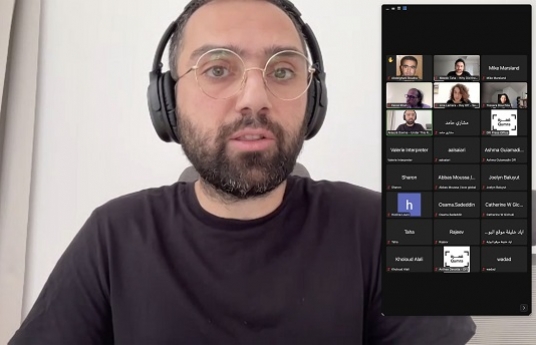قمرة 2022 يدعم حقبة جديدة من المسلسلات من المنطقة العربية والملائمة للجمهور العالمي
20 مارس 2022

- صناع المسلسلات في مرحلة التطوير يقولون مؤسسة الدوحة للأفلام في خلق مركز سينمائي في قطر يدعم جميع أنماط الفنون السينمائية
الدوحة، قطر، 20 مارس 2022: أشاد خمسة صناع مسلسلات عربية في مرحلة التطوير يشاركون في ملتقى قمرة السينمائي 2022، الحاضنة السينمائية السنوية من تنظيم مؤسسة الدوحة للأفلام، بالدور الذي يلعبه قمرة في تطوير حقبة جديدة من المسلسلات من منطقتنا العربية والملائمة للجمهور العالمي.
يدعم ملتقى قمرة السنميائي في هذه النسخة ستة مسلسلات على منصات متعددة، من ضمنها الفيديو حسب الطلب وغيرها من خدمات البث. يعكس اختيار عدد كبير من المسلسلات في هذا النسخة مدى التطور المستمر لقمرة في مواكبة أحدث التوجهات في عالم الترفيه السينمائي، خصوصاً الطلب المتزايد على المسلسلات.
وفي لقاءاتهم مع الإعلام في اليوم الأول من قمرة، اتفق صناع المسلسلات في نظرتهم بأن المسلسلات ساعدت على تطوير الصناعة السينمائية مع التأكيد على وصول القصص من المنطقة العربية إلى جمهور أوسع حول العالم.
وسلطت عائشة الجيدة وخلود العلي الضوء على قطر وعلى الأغاني التراثية المحلية المندثرة من خلال المسلسل “أغاني من التراث القطري”. فهذه الأغاني التراثية أو التهويدات تندثر مع الوقت، ولذلك ياتي المسلسل للإبقاء عليها حيّة في ذاكرة الأجيال، مع إدخال إيقاعات جديدة تلائم توجهات الأطفال في العصر الحالي وباستخدام ألوان الرسوم المتحركة الأصلية التي يعشقونها ويحبونها.
وأشارت عائشة وخلود في حديثهما: “لقد نشأنا ونحن نستمع إلى قصص أجدادنا على مدار طفولتنا والتي تبقى في ذاكرتنا. اليوم، ومع الدخول السهل إلى منصات الإعلام المختلفة، أصبح الأمر أكثر تنافسية لمواكبة أحدث التوجهات السائدة وتلبية معايير الجودة التي يتطلع إليها الصغار. ولهذا نريد أن نعيد تقديم الأغاني التراثية القطرية بقالب عصري يلائم الصغار في وقتنا المعاصر”.
كما لفتت المخرجتان بأنهما جمعتا 13 تهويدة من ضمنها الأغاني الموسمية المتعلقة بمناسبات مختلفة. وأشادتا بالدعم الذي حصلتا عليه من مؤسسة الدوحة للأفلام لتطوير المسلسل بعد حصولهما أيضاً على دعم لمشروعهما السابق.
صانع الأفلام والمؤلف اللبناني ميدو طه يهتم بالشخصيات التي تتجرأ على تخطي الحواجز الاجتماعية. ولفت في حديثه إلى أن مساندة مؤسسة الدوحة للأفلام لمشروع مسلسله شهادة على توسع مظلة قمرة في الترويج للمشاريع الدولية. وقال عن مشروعه “لماذا قطعت فرقة البلوزمان الطريق؟” بأن المسلسل “ينقسم إلى جزأين: الأول كيف يرى الناس المهاجرين العرب في الولايات المتحدة، والقسم الثاني كيف يمكن للعرب المحافظة على ثقافتهم في أي مكان كانوا”.
لماذا قطعت فرقة البلوز الطريق يتتبع مجموعة من الميكانيكيين العرب اللاتينيين وابنة رئيسهم في العمل، حيث يتركون مرآب العمل للبحث عن الحرية والحب والموسيقى. يستطشف المسلسل الصراعات الاجتماعية والنفسية للفنان المهاجر في محاولة منه للبحث عن هويته الخاصة في أميركا.
تحت هذا السقف لأريج محمود (لبنان، قطر) يدور حول امرأة ضعيفة جسدياً لكن قوية الإرادة في السبعين من عمرها تحاول اغتيال مرشح للرئاسة وتفشل في ذلك. تتقاطع قصتها مع قصة صحفي يضحي بمسيرته المهنية للوصول إلى حقيقة سمية. وقالت أريج محمود “أن الدعم الذي حصل عليه من مؤسسة الدوحة للأفلام كان كبيراً ومهماً ويظهر بأن قطر تنافس أكبر مراكز السينما في العالم لبناء أصوات سينمائية جديدة. وأضاف: “يتمحور مشروعي عن تجارب الناس في لبنان وكيف يشكلون تجربة مشتركة مع باقي العالم. مع انشغال العالم بمزيد من المشاكل، أؤمن بأن تجاربنا يمكن أن تصل للناس في أماكن مختلفة من العالم”.
محمد يوسف مخرج مسلسل “خارج تفكيري“ (قطر، الصومال، جيبوتي) يؤكد الحاجة إلى الأصالة في السرد القصصي، مضيفاً بأن مشروع مسلسله يعكس طموحاته الخاصة وتحوله الداخلي. وقال بأنه من المهم بألا نكتب من دون الاخذ بعين الاعتبار الجمهور أو الاعتبارات الأخرى وأنه تعلم بأن يرى الأشياء من زاوية مختلفة وهو ما ساعده في عمله.
يتتبع المسلسل الكوميدي كاتباً صومالياً مكافحاً يعيش في دبي ويقرر أن يصبح مقدم عروض كوميدية على المسرح وهو الحلم الذي طالما سعى أن يحققه المخرج نفسه. لكنه يجب أولاً أن يتخلى عن مسيرته المهنية ككاتب وعن العملاء العنصريين وعن مجموعة من الأصدقاء وأفراد العائلة، وكذلك أوجه القصور التي يعاني منها شخصياً.
تتتبع لينا لمارا، المخرجة والكاتبة الفرنسية الجزائرية في مسلسلها “يوم عطلة“ (فرنسا، المغرب، قطر) شخصيات مختلفة في عدة مدن من ضمنها الدوحة. وقالت: “المسلسل يدور حول كيفية إيجادهم للسعادة خلال يوم إجازتهم، ويستكشف إمكانية تقسيم يوم الإجازة بين ما يتوقعه منا المجتمع للقيام به وما نريد نحن أن نقوم به. المسلسل فضاء حالم حيث كل شيء ممكن، ورسالته تدور حول الحرية. بعد تصوير أول حلقتين في الدوحة، يشكل المسلسل نافذة على البلد ويربط كذلك الناس مع باقي العالم. هدفي هو جمع الناس من خلال هذا العمل”.
من جهتها أوضحت يسرا بوشتيا (المغرب، الولايات المتحدة) مخرجة مسلسل “ياسمين/جاسمين“ بأن المسلسلات تساعد على التقارب مع الجمهور في العالم، وأشارت إلى أن مسلسلها هو “قصة عن مهاجرة حقيقية وعن إعادة التواصل مع الجذور والتحولات الشخصية. في هذا السياق، إنه قصة عالمية لأن العديد من الأشخاص يصارعون عند السؤال عن الانتماء”.
يتركز المسلسل المحدود بساعة واحدة على جاسمين، وهي مهاجرة من الجيل الأول تعاني من حزن وجودي عميق متعلق ببعدها عن وطنها في شمال إفريقيا. تقع جاسمين في حالة عميقة من الصدمة بعد وفات والدتها المفاجئة، والتي تؤدي بالتالي إلى إطلاق مكثف لرؤى مرعبة لشبح تسمى ياسمين والتي تنمو باضطراد في حياة جاسمين المضطربة في أميركا”.